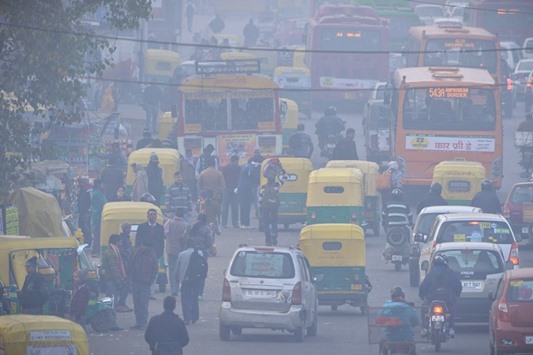India’s top environmental court yesterday ordered authorities to remove all diesel vehicles at least 10 years old off the capital city’s streets in a bid to help clean New Delhi’s polluted air.
The ruling is the latest in a series of court-issued orders targeting the automotive industry’s role in polluting Delhi’s air, which the World Health Organisation said in May was the world’s 11th dirtiest.
Under the order, effective immediately, the National Green Tribunal (NGT) directed the Delhi transport authority to cancel the registration of all diesel-powered vehicles produced at least 10 years ago.
New Delhi’s transport office must also provide the court with a list of vehicles losing their registration, the tribunal said.
The court was not immediately available for comment.
Experts are divided on the extent to which vehicles are responsible for Indian urban pollution, but several have called for a ban on diesel vehicles because they pollute more than petrol-fuelled cars and motorcycles.
Last year, the Supreme Court temporarily banned the sale of large diesel cars in New Delhi.
The court also has indicated that it could levy an additional tax on the sale of diesel cars, potentially hitting sales of carmakers such as Toyota Motor Corp, Mahindra & Mahindra and Tata Motors.
“Without registration, these (vehicles) will not be able to ply at all. This is effective immediately,” lawyer Vardhaman Kaushik, who lodged the petition seeking the order, said.
Traffic police say they have issued fines and impounded some 3,000 vehicles, but many reappear on the roads after owners pay the penalty or win court appeals to have their cars released.
Kaushik said yesterday’s order plugs these legal loopholes and comes after the Delhi and national governments were pressured to clean up the air which chokes the capital for months of the year.
Previous court bans on older diesel vehicles in New Delhi have been poorly enforced, and Deepesh Rathore, a director at Emerging Markets Automotive Advisors, said yesterday’s ruling was “quite unplanned and arbitrary in nature.”
“While we are all concerned about badly maintained vehicles causing pollution, the solution to that is to make annual vehicle health checks mandatory,” he said.
“If today the NGT can do this thing without any warning, any planning or any heads-up then in five years the same can be done for petrol vehicles as well.”
Rathore estimates that nearly 20% of future diesel vehicle sales could switch to petrol in response to the bans.
Air pollution has rocketed up the list of public concerns among India’s increasingly vocal urban middle class.
The Delhi government this year restricted cars from travelling on the roads to alternate days for a two-week period while the federal government introduced an additional ‘green’ tax on car sales in February.
In 2014, the green court said all vehicles – diesel and petrol – more than 15 years old will not be permitted to run on the city roads.
But despite the orders, older cars continued to ply with the city government saying only the regional transport office (RTO) had the authority to ban old vehicles.
That implementation glitch was resolved yesterday with the NGT asking the RTO to issue a public notice after cancelling the registration of older vehicles and supply a list of such vehicles to the traffic police.
The NGT also asked the ministry of heavy industries to file an affidavit, giving the status of electric and hybrid vehicles in India and also mention the benefits the government was considering for those who wish to dispose of old vehicles.
The green court also ordered the ministry to write a letter to the chief secretaries of all states within one week on this.
Last week, the NGT asked the Delhi government to submit an action-taken report on the ban orders and give data on the number of cars impounded.

Commuters travel on a polluted road near a bus terminus in the Anand Vihar District of New Delhi. The National Green Tribunal yesterday ordered all diesel vehicles older than 10 years be deregistered.
